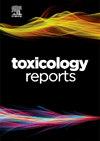Endocrine-disrupting chemicals (EDCs) and epigenetic regulation in embryonic development: Mechanisms, impacts, and emerging trends
Q1 Environmental Science
引用次数: 0
Abstract
Endocrine-disrupting chemicals (EDCs) are prevalent ecological pollutants that interfere with hormonal systems and pose serious health risks to the public, especially during critical developmental windows. Well-known EDCs, such as bisphenol A (BPA) and phthalates, can alter gene regulation and induce epigenetic modifications that worsen reproductive and developmental disorders. This review explores the intricate relationships that exist among epigenetic mechanisms, EDCs, and embryonic development, with a focus on significant modifications such as DNA methylation, histone modifications, and noncoding RNA dynamics that are critical for cellular differentiation. We review the possible health implications of EDC-induced epigenetic changes, focusing on how they could increase susceptibility to diseases. In addition, we provide a critical review of the available treatments aimed at reversing these epigenetic changes and highlight the groundbreaking technologies of high-throughput sequencing and CRISPR-based epigenome editing that are redefining the understanding of EDC effects. This thorough analysis highlights the necessity of efficient regulations that lower EDC exposure as well as the possibility of customized preventative measures to ensure developmental safety.
胚胎发育中的内分泌干扰物质(EDCs)和表观遗传调控:机制、影响和新趋势
内分泌干扰化学物质(EDCs)是一种普遍存在的生态污染物,它干扰激素系统,对公众构成严重的健康风险,特别是在关键的发育窗口期。众所周知的EDCs,如双酚A (BPA)和邻苯二甲酸盐,可以改变基因调控并诱导表观遗传修饰,从而恶化生殖和发育障碍。这篇综述探讨了表观遗传机制、EDCs和胚胎发育之间存在的复杂关系,重点关注DNA甲基化、组蛋白修饰和非编码RNA动力学等对细胞分化至关重要的修饰。我们回顾了edc诱导的表观遗传变化可能对健康的影响,重点是它们如何增加对疾病的易感性。此外,我们对旨在逆转这些表观遗传变化的现有治疗方法进行了批判性回顾,并强调了高通量测序和基于crispr的表观基因组编辑的突破性技术,这些技术正在重新定义对EDC效应的理解。这项全面的分析强调了有效法规的必要性,以降低EDC的暴露,以及定制预防措施的可能性,以确保开发安全。
本文章由计算机程序翻译,如有差异,请以英文原文为准。
求助全文
约1分钟内获得全文
求助全文
来源期刊

Toxicology Reports
Environmental Science-Health, Toxicology and Mutagenesis
CiteScore
7.60
自引率
0.00%
发文量
228
审稿时长
11 weeks
 求助内容:
求助内容: 应助结果提醒方式:
应助结果提醒方式:


